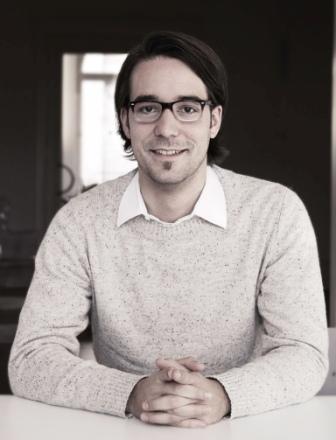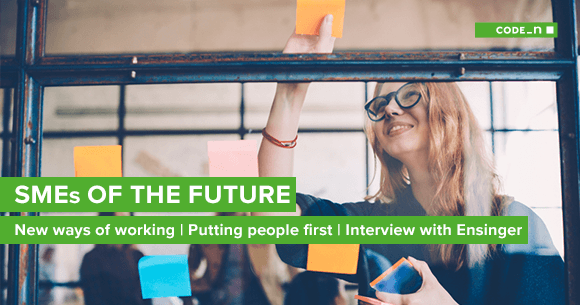ADRIAN THOMA: “WE DON’T COMPETE WITH EXISTING MARKET FORCES – WE LEVERAGE BEHAVIOR LEARNED FROM THEM.”ADRIAN THOMA: „WIR BAUEN AUF GELERNTEM VERHALTEN VON EXISTIERENDEN MARKTMÄCHTEN AUF, KONKURRIEREN NICHT GEGEN SIE.“
In a digital interview with Oliver Gassner, Adrian Thoma tells us about his personal experiences with Sellaround and Maria GmbH, and explains why social commerce is a further step in the evolution of e-commerce. He also describes what makes a startup successful in his eyes, and why contests are so important.
 Oliver Gassner: Hello Adrian, would you please introduce yourself to our readers?
Oliver Gassner: Hello Adrian, would you please introduce yourself to our readers?
Adrian Thoma: Sure! My name is Adrian Thoma, and I’m the Managing Director of Sellaround GmbH in Stuttgart, Germany. I founded my first company in 2008, Maria GmbH – a creative agency that has since grown to over 20 employees. It originated the Simpleshow video presentation format, which we’re using with great success for our customers to explain all kinds of topics and products in only three minutes. Sellaround, which was initially created as an agency project and spun off as an independent company in April 2011, was also developed by Maria.
OG: What exactly is Sellaround?
AT:Sellaround lets brands monetize their social reach using selling widgets. The widgets are actually mini-shops that can be embedded anywhere – on blogs, as a Twitter link, on Google+ or a Facebook news stream – much like a YouTube video. They allow the direct sale of products in places where today’s customers are spending more and more time.
OG: So these are new goods being sold by the manufacturer or a distributor, not by anyone like on eBay?
AT: That depends. We have a self-service platform for private vendors and small traders at www.sellaround.net. There, anyone can set up an account and create a widget they can share in two minutes. We offer professional brands the option of managing the creation and distribution of widgets completely for them, or developing interfaces to their ERP and shop systems. The interfaces ensure that the order data lands directly in their systems, without creating an island solution.
OG: If I understand you correctly, I can make purchases in the widget without leaving the website. How do I pay?
AT: PayPal is our trusted payment services provider. That has three advantages: Firstly, it makes receiving money extremely easy for sellers. All they have to do is give us their PayPal address, and with that we know where to send the buyer. It also makes the checkout process really simple for buyers, because PayPal lets them manage their delivery address. That way, the widget only needs to manage the shopping cart information. And finally, PayPal is always at the cutting edge in mobile payment, which is becoming increasingly important.
OG: It does sound a bit like eBay. As a startup, how do you position yourself relative to such a market force?
AT: eBay is a closed marketplace with enormous reach. We can’t compete with it, and we don’t intend to. We believe that reach is increasingly being distributed across numerous channels these days. And if you look back one year, Google+ is one of today’s major channels that didn’t even exist at that time. In other words, the online world and its channels are changing – above all, they’re diversifying rapidly. And we’re helping brands monetize channels that were previously undeveloped. Social Commerce is the natural evolution of traditional e-commerce in our eyes. So we don’t compete with existing market forces – we leverage behavior learned from them.
OG: The CODE_n contest is designed to give startups greater visibility. Do you think such contests are useful, or more of a distraction?
AT: The registration process in any competition naturally requires quite a bit of effort. But if there’s one thing a startup needs (in addition to a fascinating product), it’s visibility and attention. Events with a high public impact and prizes can only be helpful in that respect.
OG: What do startups really need – assuming they have developers and an alpha: connections, good advice, money?
AT: That’s almost the correct order. I believe that a good idea will also attract the right people to realize it. In my opinion, the network is surely the most time-critical aspect. The people behind (Internet) startups are frequently young founders who depend on advocates and coaches who give them access to their networks. If you tap the right people in those networks, good advice and money come almost by themselves.
OG: Is it true that staffing is a bit easier when basing a startup on an existing agency?
AT: In some cases. From the first sketches to the prototype and seed financing, we needed about a year. We financed that period entirely through the agency. However, you can imagine that when in doubt, you’d rather put your resources into an urgent job for a customer than your own side project. Prioritization is always difficult for in-house projects. Originally, we hadn’t even planned to found a startup – we just did it. The advantage to founding one without an agency is definitely the tighter focus and planning that arises from the much greater pressure and need to deliver.
OG: Fifty CODE_n finalists will get a space at the CeBIT exhibition in a special CODE_n hall. What’s your killer tip for a startup that wants to make the most of that opportunity?
AT: You mean what a startup can do at CeBIT?
OG: That’s right.
AT: What I really liked as an attention-grabber for a presentation was last year’s “Gotta Share” musical at the 2011 GEL Conference – kudos to any startup that pulls something like that off in German!
OG: Which (new) web or mobile tool had the greatest impact on your use of the Net in the past twelve months?
AT: Mobile: Instagram! I’ve rarely come across an app that’s so compelling. It’s also a prime example of the megatrend to focus on users and empower them. Suddenly, anyone can take great photos – it’s brilliant! Web: Soundcloud. It redefined the visualization of sound on the web, and it looks beautiful when operating and playing.
OG: Which startup in Germany, Austria or Switzerland (with the exception of your own and your clients) should we also interview?
AT: It would be easy to feature Berlin, of course, but I’m too parochial to do that :). I believe that the Stuttgart-based startup Conceptboard has truly succeeded in simplifying collaboration. And that’s really the kind of startup that the world needs: one that streamlines our increasingly complicated day-to-day life.
OG: Then your tastes are similar to those of the CODE_n contest jury, which selected Conceptboard as one of its 50 finalists for CeBIT. 🙂 Thank you for your time and the interview. 😉
AT: My pleasure!
And that’s how the Simpleshow explains Sellaround:
http://youtu.be/0FmG3aGVPrQIm digitalen Interview mit Oliver Gassner erzählt Adrian Thoma von seinen persönlichen Erfahrungen mit Sellaround und der Maria GmbH und erklärt, warum Social Commerce eine weitere Stufe vom Internethandel ist. Außerdem zeigt er auf, was ein Startup in seinen Augen erfolgreich macht und warum gerade Wettbewerbe für sie so wichtig sind.
 Oliver Gassner: Hallo Herr Thoma, würden Sie sich unseren Lesern bitte kurz vorstellen?
Oliver Gassner: Hallo Herr Thoma, würden Sie sich unseren Lesern bitte kurz vorstellen?
Adrian Thoma: Gerne! Mein Name ist Adrian Thoma, und ich bin Geschäftsführer der Sellaround GmbH aus Stuttgart. Ich habe meine erste Firma 2008 gegründet, die Maria GmbH – eine Kreativagentur mit mittlerweile über 20 Mitarbeitern. Daraus hervorgegangen ist das Videoerklärformat Simpleshow, mit dem wir sehr erfolgreich für Kunden alle möglichen Arten von Themen und Produkten erklären, und zwar in 3 Minuten. Ebenfalls aus der Maria hervorgegangen ist Sellaround, das zunächst als Agenturprojekt entstand und im April 2011 als eigenständige Firma ausgegründet wurde.
OG: Was genau ist Sellaround?
AT:Sellaround ermöglicht Marken, ihre soziale Reichweite zu monetarisieren, und zwar mit Hilfe so genannter Selling Widgets. Diese Widgets sind eigentlich kleine Mini-Shops, die ähnlich wie ein Youtube-Video überall eingebunden werden können: auf Blogs, als Twitter-Link, in Google+ oder im Facebook-Newsstream. Dadurch können Produkte direkt dort verkauft werden, wo sich die Kunden von heute immer mehr aufhalten.
OG: D.h. verkauft wird Neuware vom Hersteller oder Vertrieb, nicht wie bei eBay von jedem?
AT: Sowohl als auch. Für private Verkäufer und kleine Händler gibt es unter www.sellaround.net eine so genannte „Self-Service-Plattform”, heißt: Jeder kann in 2 Minuten einen Account anlegen und ein Widget erstellen, das dann geteilt werden kann. Für professionelle Marken bieten wir die Möglichkeit, die Erstellung der Widgets und deren Verteilung entweder komplett zu übernehmen oder Schnittstellen zu deren ERP- und Shop-Systemen zu entwickeln. Durch diese Schnittstellen landen dann auch Bestelldaten direkt im System, ohne dass eine Insellösung geschaffen wird.
OG: Wenn ich recht verstehe, kann ich im Widget kaufen, ohne die Webseite zu verlassen. Wie bezahle ich?
AT: Der Payment-Dienstleister unseres Vertrauens ist PayPal. Das hat drei Vorteile: Zum einen ist das Geldempfangen für Händler extrem leicht, da sie bei uns lediglich ihre PayPal-Adresse hinterlegen müssen, damit wir wissen, wohin wir den Käufer schicken müssen. Zum anderen ist der Checkout für Käufer wahnsinnig einfach, da sie über PayPal ihre Lieferadresse verwalten können und so im Widget eigentlich nur die Warenkorbangaben machen müssen. Und zu guter Letzt ist PayPal auch in Sachen Mobile Payment immer vorne dran, was zunehmend wichtiger wird.
OG: So ein bisschen klingt das ja schon wie eBay. Wie stellt man sich als Startup gegen eine solche Marktmacht auf?
AT: eBay ist ein geschlossener Marktplatz mit immenser Reichweite. Da können und wollen wir ja gar nicht gegen ankommen. Wir sagen: Heutzutage ist Reichweite zunehmend auf vielen Kanälen verteilt. Und wenn man ein Jahr zurückschaut war da ein heute wichtiger Kanal wie Google+ noch gar nicht auf der Agenda. Sprich: Die Online-Welt und ihre Kanäle ändern sich, und vor allem diversifizieren sie sich schnell. Und wir helfen Marken dabei, diese bisher unmonetarisierbaren Kanäle zu erlösen. Social Commerce ist in unseren Augen daher die natürliche Weiterentwicklung von klassischem E-Commerce, eine weitere Stufe der Evolution. Wir bauen also auf gelerntem Verhalten von existierenden Marktmächten auf, konkurrieren nicht gegen sie.
OG: Der CODE_n-Wettbewerb will Startups mehr Sichtbarkeit verschaffen. Ist so etwas nützlich oder lenkt es ab?
AT: Sicherlich ist der Anmeldeprozess bei jedem Wettbewerb aufwendig. Aber wenn ein Startup eines braucht (neben einem faszinierenden Produkt), ist das Sichtbarkeit und Aufmerksamkeit. Öffentlichkeitswirksame Veranstaltungen und Preise sind da sicher nur hilfreich.
OG: Was brauchen Startups wirklich – wenn wir mal annehmen, dass sie Developer und einen Alpha haben: Connections, guten Rat, Geld?
AT: Eigentlich fast diese Reihenfolge. Ich glaube daran, dass eine gute Idee auch die richtigen Leute zur Umsetzung anlockt. Das in meinen Augen zeitkritischste ist sicherlich das Netzwerk. Hinter (Internet-)Startups stehen nun mal häufig junge Gründer, die sind in Sachen Netzwerk auf Förderer und Coaches angewiesen, die ihnen ihr Netzwerk zu Verfügung stellen. Wenn man sich aus diesem Netzwerk die richtigen Leute zieht, dann kommt gute Beratung und Geld fast von alleine.
OG: Ist es so, dass man es etwas einfacher mit dem Personal hat, wenn man wie Sie aus einer bestehenden Agentur heraus gründet?
AT: Teilweise. Wir haben von den ersten Skizzen bis zum Prototypen und Seed-Finanzierung ungefähr ein Jahr gebraucht. Das haben wir komplett aus der Agentur heraus finanziert. Allerdings können Sie sich vorstellen, dass man im Zweifel dann doch lieber Ressourcen in ein dringendes Kundenprojekt steckt als in ein Liebhaberprojekt. D.h. die Priorisierung ist bei Eigenprojekten immer schwierig. Wir hatten ja anfangs gar nicht vor, ein eigenes Startup zu gründen, wir haben einfach mal gemacht. Der Vorteil einer Gründung ohne Agentur ist daher definitiv die Fokussierung und die Planung, weil man viel mehr unter Druck steht und liefern muss.
OG: Die 50 CODE_n Finalisten bekommen einen Ausstellungsplatz auf der CeBIT in einer speziellen CODE_n-Halle. Was ist Ihr Killer-Tipp für ein Startup, wie es diese Gelegenheit optimal nutzen kann?
AT: Sie meinen jetzt, was ein Startup vor Ort auf der CeBIT machen kann?
OG: Genau.
AT: Was ich letztes Jahr schön fand als Tamtam für eine Präsentation, war das “Gotta Share” Musical bei der GEL Conference 2011 – Ehre dem Startup, das das so gut in Deutsch hinbekommt!
OG: Was war das (neue) Web- oder Mobiltool, das Ihre Art der Netznutzung in den letzten 12 Monaten am meisten verändert hat?
AT: Mobile: Instagram! Selten eine App gesehen, die man einfach benutzen muss. Ist sicherlich auch ein Paradebeispiel im Rahmen des Megatrends, den Nutzer in den Mittelpunkt zu stellen und ihn zu “empowern”. Auf einmal kann jeder tolle Fotos machen – genial! Web: Soundcloud. Hat die Visualisierung von Sound im Web neu definiert und sieht schön aus beim Bedienen und Abspielen.
OG: Welches Startup in DACH (mal Ihre und die Ihrer Kunden ausgenommen) sollten wir ebenfalls interviewen?
AT: Berlin zu featuren wäre sicherlich leicht, aber da bin ich zu lokalpatriotisch :). Ich glaube, dass es das Stuttgarter Startup Conceptboard tatsächlich geschafft hat, Kollaboration zu vereinfachen. Und das sind ja eigentlich die Art Startups, die die Welt braucht: Vereinfachung des immer komplizierter werdenden Alltags.
OG: Da haben Sie einen ähnlichen Geschmack wie die Jury des CODE_n Contest. Die hat Conceptboard als einen von 50 Finalisten für die CeBIT ausgewählt. 😉 Vielen Dank für das Interview und Ihre Zeit 😉
AT: Sehr gerne, hat mich gefreut!
Und so erklärt die Simpleshow Sellaround:







Write a comment